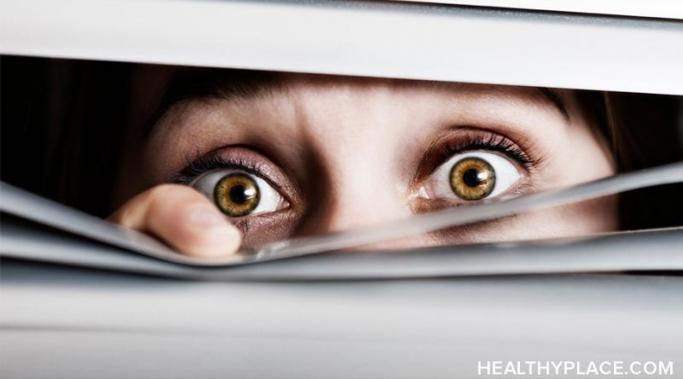Women are classic “I’m sorry” – ers. We’re taught to say “I’m sorry” from the time we can utter the words. We are the peacekeepers, claiming fault so no one else has to. We have to apologize for emotions because we’re “overemotional.” We have to apologize for our needs because we’re “clingy.” We’re sorry for our behavior, our significant other’s behavior and our children’s behavior. We are simply, sorry.
And most women in 2011 realize this habit is one borne of the past and is no longer relevant in our everyday world. We realize we are not “sorry” at the drop of a hat or a glass of wine spilled by a drunken significant other. We realize there is a time to be sorry and there are times not to be.
Unfortunately for me, I feel like I have to be sorry all the time, for every tear, for every thought, because if I’m not, people will leave.
Talking About Bipolar
I grew up in a small town where there was no diversity of any sort, in beliefs or otherwise. And one of the things an outspoken group really didn’t like was gay people. This group lodged a major war to ensure that anything ever mentioning homosexuality was banned from my high school.
I thought these people were idiots. So I fought them. I wasn’t about to let some closed-minded, ignorant people marginalize others based on their sexuality. I went to their rallies and spoke against them. I wrote stories for our paper.
And then, sometime around age 17 I figured out I was bisexual. So I jumped into a closet for a few years.
This week one of my Twitter followers asked me for advice on communicating with her friends and family about her mental illness. She has only recently started telling people of her illness and she wasn’t sure on how to express her needs around her mental illness.
This is a great question and one I think every person with a mental illness faces. How do you tell people about your mental illness needs?
I recently received a comment regarding bipolar medication, its development and the mental health care system in general. The commenter accuses the mental health community of being corrupt and asks, “Why are we forced to take such bad bipolar medicines?”
When we were children, for most of us, Christmas was magical. You got to tear into shiny wrapping paper and discover the most amazing and wondrous gifts inside. There was a Santa Claus who confirmed we had been good all year long. There was a Christmas tree reaching to the sky and cookies and candies abounded. Our four-year-old, six-year-old, eight-year-old minds didn’t see the faults, cracks, bills and squabbles. All we remember is the Barbies, remote-control cars and cookies for Santa.
And so it should be. Those memories, even if mostly embellishments of imagination, are great to hold onto.
The problem is, for some reason, we spend our entire adult lives trying to recreate the magic that never existed in the first place.
I am a word-fetishist. I adore words. They are my playthings. They are my blankies. I generally mold them, shape them and occasionally break them at my leisure.
But I also respect words. I respect their meaning and their use outside the bounds of current politically correct, self-help thinking, but somehow the rest of the world wants to complain because I call a spade a shovel.
Many of us with a mental illness have tried to “power through” it. We have tried to muscle through the pain without getting help of any kind. Most of us don’t want to admit we need help. Most of us don’t even want to admit we’re sick. We think that we’ll be fine without doctors and therapists and pills. We think that they are the enemy. We think we’re better off without them.
We are so ridiculously wrong.
Normally I try to grab the reader's attention in the first few lines of the piece so that you'll want to read the rest. Something snappy, touching or pithy. Normally I try to make sure it's an interesting subject. Usually I try to provide some sort of universal appeal to the piece or at least a good quip.
But today, quite frankly, I'm talking about me.
I know that as a semi-public person with bipolar disorder I am supposed to beam hope. I am supposed to remind people of it, write about it, speak about it, and give it to everyone wrapped in a shiny happy wrapper.
I don’t do this.
There is, without doubt, hope to be had, out there in the bipolar treatment world, but that doesn’t mean I particularly feel too strongly about it personally.
Next week is Mental Illness Awareness Week in Canada and the US. It's our week to get out, speak up and be heard. It's our week not to be ashamed of our illness or the illness of our loved ones. It's our week to march, write, Twitter, Facebook, talk and tell politicians how important issues of mental illness are.
But what if you don't want the world knowing you have a mental illness?



